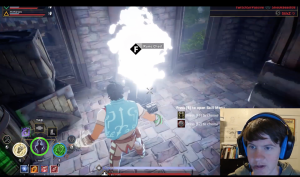Video Games Let Me Be Competitive Without the Need to Be Physical
Written by |

I’m not going to be an athlete — and that’s OK. I’ve found a competitive outlet through video games. While sports helps to build friendships and engage in teamwork (I had felt excluded from that opportunity for comradery), video games have leveled the playing field for me.
I have fond memories of playing “Halo“ in the basement with friends. I was good at the game. I would win, and I would lose. But whatever the outcome, we still had a great time. We didn’t talk a lot (mostly grunting and yelling), but I felt that I could bond with my friends doing something that didn’t require athletic ability.
I also enjoy video games without my friends. They transport me to a world where I am in control of my game character. I like improving my skills and rank within a game, and that’s where I can let my competitive nature shine.
I remember getting my first gaming device: a fancy new Game Boy Advance SP. I logged a lot of hours on that device, and my parents gained hours of conversation after dinner. I played along as Mario journeyed to set Princess Peach free. I competed against myself by aiming for a higher score every time I played. It satisfied my need for competition without harming my muscles.
Later on, I discovered “League of Legends“ through some of my middle school friends. The game, which pits teams of five against each other across a large map, requires practice, strategy, creativity, teamwork, and patience to win and attain a higher rank. I like the competitive nature of the game and learning how to work in a team. This game allowed me to further hone those skills.
I’ve always had good hand-eye coordination, but my parents and I quickly realized that that skill couldn’t be applied to sports. Video games let me use my gift competitively without hurting myself.
Video games are more accessible to me, as they require little physical effort and are as much fun to play as sports with friends. Gaming companies are working with players to develop accessible controls and workarounds. Last year, Xbox released a customizable controller that works with accessible devices.
Video games have also helped me to connect with my high school friends and bond virtually. While it’s not comparable to being in the same physical place, virtual gaming helps to maintain and build those connections. After I graduate, I can stay connected with my college friends in the same way.
Some people may argue that video games are too violent or a waste of time. I agree that there are dangers with video games and that addiction is a serious problem. The World Health Organization defines gaming disorder as increasing priority given to gaming that takes away from school, life, and relationships.
For someone like me, who can’t express himself physically, video games have become a way for me to compete, build my imagination, and learn teamwork without needing to be on the field. Gaming has also helped me to make new friends. Video games are freeing for me: I can do more in these virtual worlds than I could ever dream of accomplishing in reality.
***
Note: Muscular Dystrophy News is strictly a news and information website about the disease. It does not provide medical advice, diagnosis or treatment. This content is not intended to be a substitute for professional medical advice, diagnosis, or treatment. Always seek the advice of your physician or another qualified health provider with any questions you may have regarding a medical condition. Never disregard professional medical advice or delay in seeking it because of something you have read on this website. The opinions expressed in this column are not those of Muscular Dystrophy News or its parent company, Bionews Services, and are intended to spark discussion about issues pertaining to muscular dystrophy.








Leave a comment
Fill in the required fields to post. Your email address will not be published.